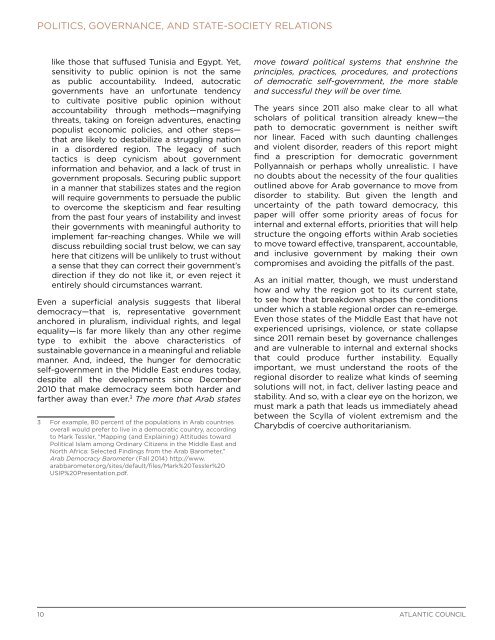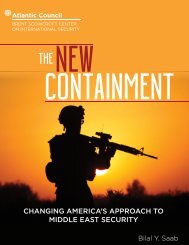POLITICS GOVERNANCE STATE-SOCIETY RELATIONS
Politics_Governance_and_State-Society_Relations_web_1121
Politics_Governance_and_State-Society_Relations_web_1121
Create successful ePaper yourself
Turn your PDF publications into a flip-book with our unique Google optimized e-Paper software.
<strong>POLITICS</strong>, <strong>GOVERNANCE</strong>, AND <strong>STATE</strong>-<strong>SOCIETY</strong> <strong>RELATIONS</strong><br />
like those that suffused Tunisia and Egypt. Yet,<br />
sensitivity to public opinion is not the same<br />
as public accountability. Indeed, autocratic<br />
governments have an unfortunate tendency<br />
to cultivate positive public opinion without<br />
accountability through methods—magnifying<br />
threats, taking on foreign adventures, enacting<br />
populist economic policies, and other steps—<br />
that are likely to destabilize a struggling nation<br />
in a disordered region. The legacy of such<br />
tactics is deep cynicism about government<br />
information and behavior, and a lack of trust in<br />
government proposals. Securing public support<br />
in a manner that stabilizes states and the region<br />
will require governments to persuade the public<br />
to overcome the skepticism and fear resulting<br />
from the past four years of instability and invest<br />
their governments with meaningful authority to<br />
implement far-reaching changes. While we will<br />
discuss rebuilding social trust below, we can say<br />
here that citizens will be unlikely to trust without<br />
a sense that they can correct their government’s<br />
direction if they do not like it, or even reject it<br />
entirely should circumstances warrant.<br />
Even a superficial analysis suggests that liberal<br />
democracy—that is, representative government<br />
anchored in pluralism, individual rights, and legal<br />
equality—is far more likely than any other regime<br />
type to exhibit the above characteristics of<br />
sustainable governance in a meaningful and reliable<br />
manner. And, indeed, the hunger for democratic<br />
self-government in the Middle East endures today,<br />
despite all the developments since December<br />
2010 that make democracy seem both harder and<br />
farther away than ever. 3 The more that Arab states<br />
3 For example, 80 percent of the populations in Arab countries<br />
overall would prefer to live in a democratic country, according<br />
to Mark Tessler, “Mapping (and Explaining) Attitudes toward<br />
Political Islam among Ordinary Citizens in the Middle East and<br />
North Africa: Selected Findings from the Arab Barometer,”<br />
Arab Democracy Barometer (Fall 2014) http://www.<br />
arabbarometer.org/sites/default/files/Mark%20Tessler%20<br />
USIP%20Presentation.pdf.<br />
move toward political systems that enshrine the<br />
principles, practices, procedures, and protections<br />
of democratic self-government, the more stable<br />
and successful they will be over time.<br />
The years since 2011 also make clear to all what<br />
scholars of political transition already knew—the<br />
path to democratic government is neither swift<br />
nor linear. Faced with such daunting challenges<br />
and violent disorder, readers of this report might<br />
find a prescription for democratic government<br />
Pollyannaish or perhaps wholly unrealistic. I have<br />
no doubts about the necessity of the four qualities<br />
outlined above for Arab governance to move from<br />
disorder to stability. But given the length and<br />
uncertainty of the path toward democracy, this<br />
paper will offer some priority areas of focus for<br />
internal and external efforts, priorities that will help<br />
structure the ongoing efforts within Arab societies<br />
to move toward effective, transparent, accountable,<br />
and inclusive government by making their own<br />
compromises and avoiding the pitfalls of the past.<br />
As an initial matter, though, we must understand<br />
how and why the region got to its current state,<br />
to see how that breakdown shapes the conditions<br />
under which a stable regional order can re-emerge.<br />
Even those states of the Middle East that have not<br />
experienced uprisings, violence, or state collapse<br />
since 2011 remain beset by governance challenges<br />
and are vulnerable to internal and external shocks<br />
that could produce further instability. Equally<br />
important, we must understand the roots of the<br />
regional disorder to realize what kinds of seeming<br />
solutions will not, in fact, deliver lasting peace and<br />
stability. And so, with a clear eye on the horizon, we<br />
must mark a path that leads us immediately ahead<br />
between the Scylla of violent extremism and the<br />
Charybdis of coercive authoritarianism.<br />
10 ATLANTIC COUNCIL



